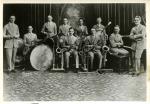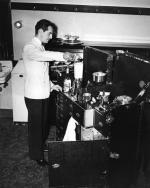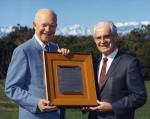![header=[Marker Text] body=[World-renowned choral arranger and band leader, Waring was born and raised in Tyrone. In 1919, while attending Penn State, he started "Fred Waring and the Pennsylvanians," a popular musical group that entertained for seven decades on stage, screen, radio, and TV. ] sign](http://explorepahistory.com/kora/files/1/10/1-A-26E-139-ExplorePAHistory-a0h8d1-a_450.jpg)
Mouse over for marker text
Name:
Fred Waring
Region:
Allegheny National Forest Region
County:
Blair
Marker Location:
SE corner of Pennsylvania Ave. & 11th St., Tyrone
Dedication Date:
October 6, 2005
Behind the Marker
It has been said that Fred Waring taught America how to sing, and given the number of voices he trained through the years, that's not much of an exaggeration. Nor is this: Fred Waring also taught America how to mix. One of the most popular and enduring maestros of the twentieth century, Waring left his legacy on millions of recordings. Leading the beloved choral institution he dubbed The Pennsylvanians, Waring - a name later synonymous with American choral music - couldn't even make his own college glee club.
Frederick Malcolm Waring was born on June 9, 1900, in Tyrone, Pennsylvania, a small industrial town on the edge of the Allegheny Mountains some twenty miles southwest of State College, a location that figures prominently in Waring's tale. His father was a banker and leader in the temperance movement; his mother led a local choir that she rehearsed in the Waring living room.
Neither his father's orations against alcohol nor his mother's music-making escaped young Fred. By ten, he was leading Tyrone's Boy Scout drum corps, and by his late teens, he had formed a banjo quartet to play local dances with his brother Tom and two friends. Waring named his group The Banjazzatra - easier to listen to than pronounce - and conducted with one of his mother's curtain rods as his baton.
At eighteen, he left home for Penn State to study architectural engineering, but was more interested in constructing bands than buildings. Beginning with his banjo quartet, he kept adding instruments, and the group grew in demand around campus. Then, when the glee club rejected him, Waring found a way to even the score, adding to his orchestra the component that opened the door to his future: voices. With its up-tempo beat and inviting harmonies, the group took on a life that State College could not contain. Far more popular than the college glee club, Waring's band was soon touring from coast to coast, but in one way never left home: Waring named them The Pennsylvanians.
By the mid-1920s, Waring and the Pennsylvanians were packing venues from campus mixers to hotel ballrooms and concert halls to Broadway with their lush vocals, soothing melodies and rich orchestrations - as they would continue to do, in one form or another - until 1979. Released in 1925, the Pennsylvanians' song "Collegiate" became a flapper anthem, and was the Victor Talking Machine Company's first commercial electric recording - and the earliest of Waring's notable show business firsts. (Before Waring was through, he would record nearly 2,000 songs on more than 100 albums).
In 1929, the Pennsylvanians made one of the first all-musical films, "Syncopation." In the 1930s, the Pennsylvanians - now a full choir, fifty-five voices strong - became the first musical group with a nationally broadcast radio show, and, a decade later, the first with their own TV show, which attracted Frank Sinatra, Bing Crosby, Hoagy Carmichael and other notables as guest stars.
TV show, which attracted Frank Sinatra, Bing Crosby, Hoagy Carmichael and other notables as guest stars.
Of course, Waring still cultivated the side of him that once studied engineering seriously. Knowing of his fondness for gadgets, Fred Osius in the heart of the Great Depression approached Waring after a radio concert and convinced him to fund further improvements of his blender. Waring poured $25,000 into the project and in 1937 introduced the Miracle Mixer blender at the National Restaurant Show in Chicago. The next year, Waring renamed the company and the blender after himself and in the years that followed plugged the Waring Blender at hotels and restaurants across the nation, promising that "this mixer is going to revolutionize American drinks." In the decades after the end of World War II, the Waring Blender did just that. The demands of his taxing touring schedule proved the mother of something that Waring himself invented: the traveling steam iron.
Still, if Waring was admired for his inventiveness, he was beloved for his music, and the wholesome, schmaltzy, glee-club sound the Pennsylvanians produced on hit records like "The Battle Hymn of the Republic," "Dancing in the Dark," "Sleep" and "White Christmas." Capitalizing on the popularity of his music, Waring in 1947 established a choral workshop at his base, the 600-acre Shawnee-on-Delaware Inn near Stroudsburg, to teach Americans to sing like Pennsylvanians.
Until his death in 1984, Waring scrupulously passed on to hordes of young singers - who then went home to share what they had learned with their own choirs, chorales, and glee clubs - the methods that led to the Pennsylvanians' signature sound, not the least of which was Waring's absolute insistence on precision, careful enunciation, and attentiveness to detail. "Be on your toes tonight," he would warn, "or I'll be on them tomorrow."
The Pennsylvanians were especially diligent when called to the White House. In 1943, they serenaded President Franklin Delano Roosevelt on his birthday, and in the 1950s, President Eisenhower, a particular fan, invited Waring to entertain, among others, Russian premier Nikita Khrushchev and Queen Elizabeth II of England. In 1981, Ronald Reagan, another fan, included Waring and the Pennsylvanians at an Inaugural concert at Constitution Hall.
Though Waring's career lasted nearly seventy years, his sound, in the end, was overwhelmed and overshadowed by the rise of rock and roll. In the 1960s, he tried to reach out to a new audience with a smaller, younger group of Pennsylvanians, but without anything near his old success. In his final decade, Waring opted to spend more time at home, playing golf and operating his lucrative Shawnee Press, one of the premier band- and choral-music publishers in the world.
A trouper to the end, Waring was up on stage, conducting a youth chorale the day before he died, of complications from a stroke, at eighty-four. Appropriately, the venue for this final concert was the Penn State campus where he had first elicited the Waring sound so many years before.
Today, Penn State holds Waring's vast collection of memorabilia, papers and recordings.
Frederick Malcolm Waring was born on June 9, 1900, in Tyrone, Pennsylvania, a small industrial town on the edge of the Allegheny Mountains some twenty miles southwest of State College, a location that figures prominently in Waring's tale. His father was a banker and leader in the temperance movement; his mother led a local choir that she rehearsed in the Waring living room.
Neither his father's orations against alcohol nor his mother's music-making escaped young Fred. By ten, he was leading Tyrone's Boy Scout drum corps, and by his late teens, he had formed a banjo quartet to play local dances with his brother Tom and two friends. Waring named his group The Banjazzatra - easier to listen to than pronounce - and conducted with one of his mother's curtain rods as his baton.
At eighteen, he left home for Penn State to study architectural engineering, but was more interested in constructing bands than buildings. Beginning with his banjo quartet, he kept adding instruments, and the group grew in demand around campus. Then, when the glee club rejected him, Waring found a way to even the score, adding to his orchestra the component that opened the door to his future: voices. With its up-tempo beat and inviting harmonies, the group took on a life that State College could not contain. Far more popular than the college glee club, Waring's band was soon touring from coast to coast, but in one way never left home: Waring named them The Pennsylvanians.
By the mid-1920s, Waring and the Pennsylvanians were packing venues from campus mixers to hotel ballrooms and concert halls to Broadway with their lush vocals, soothing melodies and rich orchestrations - as they would continue to do, in one form or another - until 1979. Released in 1925, the Pennsylvanians' song "Collegiate" became a flapper anthem, and was the Victor Talking Machine Company's first commercial electric recording - and the earliest of Waring's notable show business firsts. (Before Waring was through, he would record nearly 2,000 songs on more than 100 albums).
In 1929, the Pennsylvanians made one of the first all-musical films, "Syncopation." In the 1930s, the Pennsylvanians - now a full choir, fifty-five voices strong - became the first musical group with a nationally broadcast radio show, and, a decade later, the first with their own
Of course, Waring still cultivated the side of him that once studied engineering seriously. Knowing of his fondness for gadgets, Fred Osius in the heart of the Great Depression approached Waring after a radio concert and convinced him to fund further improvements of his blender. Waring poured $25,000 into the project and in 1937 introduced the Miracle Mixer blender at the National Restaurant Show in Chicago. The next year, Waring renamed the company and the blender after himself and in the years that followed plugged the Waring Blender at hotels and restaurants across the nation, promising that "this mixer is going to revolutionize American drinks." In the decades after the end of World War II, the Waring Blender did just that. The demands of his taxing touring schedule proved the mother of something that Waring himself invented: the traveling steam iron.
Still, if Waring was admired for his inventiveness, he was beloved for his music, and the wholesome, schmaltzy, glee-club sound the Pennsylvanians produced on hit records like "The Battle Hymn of the Republic," "Dancing in the Dark," "Sleep" and "White Christmas." Capitalizing on the popularity of his music, Waring in 1947 established a choral workshop at his base, the 600-acre Shawnee-on-Delaware Inn near Stroudsburg, to teach Americans to sing like Pennsylvanians.
Until his death in 1984, Waring scrupulously passed on to hordes of young singers - who then went home to share what they had learned with their own choirs, chorales, and glee clubs - the methods that led to the Pennsylvanians' signature sound, not the least of which was Waring's absolute insistence on precision, careful enunciation, and attentiveness to detail. "Be on your toes tonight," he would warn, "or I'll be on them tomorrow."
The Pennsylvanians were especially diligent when called to the White House. In 1943, they serenaded President Franklin Delano Roosevelt on his birthday, and in the 1950s, President Eisenhower, a particular fan, invited Waring to entertain, among others, Russian premier Nikita Khrushchev and Queen Elizabeth II of England. In 1981, Ronald Reagan, another fan, included Waring and the Pennsylvanians at an Inaugural concert at Constitution Hall.
Though Waring's career lasted nearly seventy years, his sound, in the end, was overwhelmed and overshadowed by the rise of rock and roll. In the 1960s, he tried to reach out to a new audience with a smaller, younger group of Pennsylvanians, but without anything near his old success. In his final decade, Waring opted to spend more time at home, playing golf and operating his lucrative Shawnee Press, one of the premier band- and choral-music publishers in the world.
A trouper to the end, Waring was up on stage, conducting a youth chorale the day before he died, of complications from a stroke, at eighty-four. Appropriately, the venue for this final concert was the Penn State campus where he had first elicited the Waring sound so many years before.
Today, Penn State holds Waring's vast collection of memorabilia, papers and recordings.









